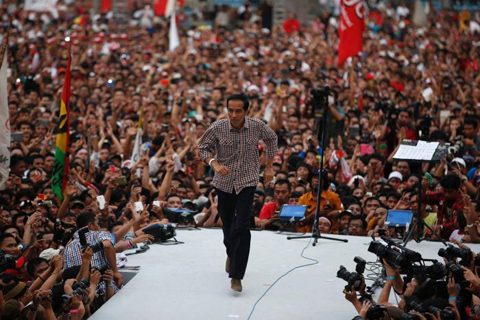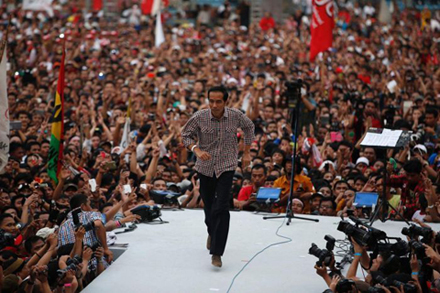Wawan Mas’udi charts Joko Widodo’s meteoric rise from furniture maker to president, and the wave of local politicians set to remake Indonesian politics.
Assuming Prabowo Subianto loses his challenge to the result of 2014’s presidential election in Indonesia’s Constitutional Court, on October 20 the Indonesian people will witness a commoner sworn in as the seventh president of the Republic.
Known as a successful furniture producer and exporter in the central Java city of Solo, Joko Widodo (Jokowi) is certainly part of wealthy class. But he forged his way from lowly beginnings as an employee of his uncle’s furniture workshop to the owner of export-oriented furniture producer
Jokowi started his own business in 1989 with a loan of Rp 15 million from his father. It wasn’t all easy. The business went bankrupt and in the early 1990s, he was forced to restart, this time with a fresh loan for Rp 500 million from state owned enterprise, State Gas Enterprise(Perum Gas Negara) who at the time was running a national program to assist small and medium-businesses (bapak angkat-anak angkat). Jokowi’s business hit new profit heights during the economic and financial crisis, as the plunging exchange rate of the rupiah to the US dollar brought a boon to exports.
Jokowi was a new magnate in Solo’s furniture industry. In 2002 he formed the Solo chapter of ASMINDO with other furniture producers where he was appointed director, his first organisational portfolio. Here, he also had his first brush with the media, being called occasionally to appear in the Solo Pos. According to Tempo magazine, Jokowi’s success in the export-oriented furniture business also attracted the attentions of retired general Luhut Binsar Panjaitan who had a mining and energy business, and forest concessions in Nunukan. Luhut and Jokowi became business partners six years ago (Luhut owns 49 per cent of shares in Jokowi’s company PT Rakabu Sejahtra.
Solo is one of the first regions to run direct elections for the head of government under Indonesia’s regional autonomy Law 32/2004. Jokowi decided to run for the 2005 direct election only after his colleagues at ASMINDO convinced him that he was good enough to stand on the political stage. Jokowi courted PAN, PKS, and PKB before finally selecting P-DIP Solo, the biggest but most financially deprived party as his political home. That year, his running mate for vice mayor was FX Hadi Rudyatmo (Rudy), a local P-DIP headman known for his extensive grass-root networks, but whose Christian religion made him certain he’d never make mayor.
P-DIP’s decision to back Jokowi’s candidacy was not without resistance, as many party members and activists viewed him as outsider. On this point, Rudy defended Jokowi by reassuring them of his nationalist-ideological blood, pointing to Jokowi’s father as a Sukarnoist. It was also Rudy who assisted Jokowi to build support amongst P-DIP constituents.
The 2005 mayoral election was a contest between Solo’s wealthy businessmen; Purnomo, a batik entrepreneur backed by PAN, Hardono a Golkar furniture businessman, and Jokowi.
In this election, Jokowi (and Rudy) secured 36.62 per cent of the vote, just a few percentage points above the local election threshold, of 30 per cent.
Mayor Jokowi inherited a distraught city. Slamet Suryanto had been voted in off the back of two deeply traumatic riots; once in 1998 during the financial crisis and again in 1999 when Megawati lost the presidential election. In Solo, many believed that the riots reflected structural problems of social poverty and vulnerability.
Slamet rode to victory with the party garnering over 50 per cent of the votes in 1999 and despite successfully consolidating the party as its leader, as mayor, he failed to win trust. He also failed to direct his government and bureaucracy to address basic services such as health, primary education, and local economy.
The Slamet administration also became associated with corruption, incompetence and the absence of policies for ordinary people gave the government a reputation for elitism. Slamet’s credibility as P-DIP’s popular mayor was vanished during his 200 to 2005 term.
Jokowi’s seven-year term as Solo mayor (from 2005-2012) ushered in a radically different mode of leadership. Jokowi make headway in public service and bureaucratic reform, focussing on pro-poor policies and populist leadership approach. Solo was one of the first cities to commit to budgetary transparency, as Jokowi ordered the city to publish budgets and planning. Local NGOs credit this step with reducing budgetary corruption. His policies on health insurance (PKMS) and education subsidies (BPMKS) opened these services up to Solo’s poor.
Jokowi cut the waiting time for a citizens’ identity card (KTP) from days to under one hour. He slashed red-tape bureaucratic procedures to obtain business permits. But his legacy was not just administrative; Jokowi believed that Solo should return its cultural roots. Dozens of street festivals and art performances were organised under Jokowi. In many of the events, he mocked himself as the main performer. Jokowi believed that Solo should be culturally attractive in order to claim back its status as the centre of Javanese culture.
When he first changed from furniture maker and exporter to local leader, Jokowi could never have imagined he’d climb so high in his political career. But it is on the shoulders of the people that he has stood tall.
His populist leadership style was genuine – and something new. He marked his second day in office in 2005 by making an impromptu visit to a slum neighbourhood. This was unprecedented in a city dominated by a culture of Javanese political hierarchy. Historically, the elite of Solo had maintained a visible distance from the people. But it was not simply symbolic; Jokowi managed to preserve ongoing dialogue with his constituents and community engagement while governing the city.
With this approach, Jokowi managed to absorb initiatives proposed by various NGOs, as well as the community’s voices in his policies. His outstanding achievements in relocating street-vendors without violence in 2006 owed to a series of conversations, not only with the vendors, but also related NGO activists.
The NGOs would continue to be a source of inspiration. Wide-ranging policies related tolocal democratic reform adopted during Jokowi’s leadership – like budget transparency, participatory planning, disability inclusion, child protection, and protection of the informal economy – were largely generated by vigorous NGOs in Solo.
Despite wide-ranging initiatives, many in Solo evaluated Jokowi’s achievements as failures since they did not prevent vulnerability among Solo’s poor. Many also believed that Jokowi’s achievements had little prospect of continuity.
There are some justified reasons for such scepticism. At first, activists were concerned with the degree of institutionalisation of Jokowi’s initiatives. In the post-Jokowi period, the mayor and also DPRD could easily revoke the initiatives (for example the health and education subsidy), as the legal frameworks were only established by mayoral-decree or as part of local regulation.
Meanwhile, activists were also uncertain about the commitment of the bureaucracy in preserving reforms.
The city’s financial capacity in the long run was also uncertain, since many social and pro-poor economic programs initiated by Jokowi depended on continuing fiscal transfer from the national government. If the transfers were stopped, the programs would perish. Such concerns were realised, when just in a month after Jokowi left Solo for Jakarta, the city government revoked his protectionist policy for ‘traditional markets’, by granting dozens of permits for the opening of ‘modern-market’ (including minimarts and supermarkets).
Despite the critiques, Jokowi’s initiatives rewarded him with more than 90 per cent of votes in his 2010 re-election. The record re-election impressed upon us one important lesson; that he was the leader the Solo people were looking for. The massive coverage of mass media and euphoric public response clearly signaled that Jokowi’s appeal had resonated beyond the mere 44 square kilometres of Solo city.
As Indonesia’s president-elect-(a mere one-and-a-half years after his remarkable victory in the Jakarta governor election), Jokowi epitomises fundamental and profound changes in Indonesian politics.
Building a political career from a local level, Jokowi’s emergence signified the importance of merit in Indonesian politics. Decentralisation and local democracy had transformed local district,city and provincial politics into a strategic arena for developing a political career, particularly in the context of ongoing political oligarchy at the national stage.
With greater government authority and political autonomy, local political leaders may exploit the opportunity to be popular figures by developing pro-people policies and intimate leadership styles.
Jokowi and many other local figures, such as Winase in Jembrana, Trimawan in Purbalingga, Gamawan in Solok, Hery Zudianto in Yogyakarta, Jarot in Blitar, Risma in Surabaya, and Ridwan in Bandung, show the future; the exemplify how to develop leadership merit in their respective local political and socio-economic contexts.
Political elites should learn that Indonesia’s strengthening democracy, honest commitment to democratic reform is the fundamental element for creating rational political legitimacy, instead of maintaining stubbornly old patronage and oligarchy.
It is through the local that the ‘global’ will be built.
……………
Wawan Mas’udi is lecturer at Department of Politics and Government, Gadjah Mada University. He is completing PhD research on local populism in a decentralised Indonesia (with a focus on Solo under Jokowi) at Victoria University, Melbourne.
 Facebook
Facebook  Twitter
Twitter  Soundcloud
Soundcloud  Youtube
Youtube  Rss
Rss 
